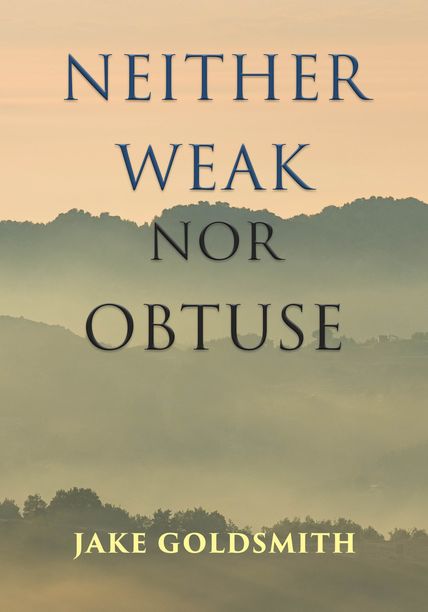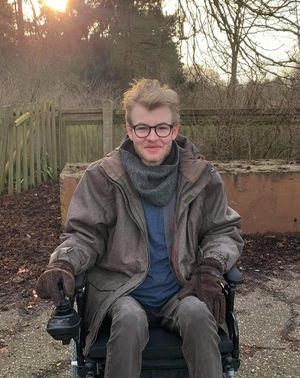
“I am very ill. That would be the first and most obvious thing to know.” Thus Jake Goldsmith, a young man with cystic fibrosis, begins this memoir, a sustained, profoundly honest and searching reflection upon the phenomenology of illness: how we perceive and respond to living with illness and dying from it, and how we fearfully evade doing so. His impassioned writing, marked by a brilliantly agonistic, idiosyncratic eloquence, transcends the snare of his own tragic circumstances, and holds up a mirror to society’s time-honored complacencies: our callous attitudes towards the disabled, our false gods, and our general neglect and distortion of the search for meaning that has for those with life-limiting conditions an especially stark urgency.
In a letter to Goldsmith’s hero, Albert Camus, Boris Pasternak wrote that while there may not be anything beyond “sensualism”, “one that is completely naked and extreme becomes weak and obtuse.” Jake Goldsmith leads us towards a humanely grounded materialism that is neither of these, valuing what is vital in human life: friendship, humor, and love, and giving us a moving glimpse at a partial truce with fear, for, he writes, “we may grow less afraid in each other’s arms.”
Jake Goldsmith is the founder of The Barbellion Prize, a book prize dedicated to the furtherance of ill and disabled voices in writing.
Notices
“This wonderful book is like an unblinking conversation with one of the most literary, most honest, most human people you will ever meet. I thank Jake for sharing his life with us, and recommend that you take him up on his invitation.”
—Tom Shakespeare (writer, researcher, broadcaster)
“A youthful self-portrait engraved with the conflicts, constraints, and losses of an age. This is the sound of honest thinking in extremis.”
—Ray Davis
“When Emily Dickinson wrote: ‘After great pain, a formal feeling comes’ she unwittingly anticipated Jake Goldsmith’s book, an urgent dispatch from the front line of chronic long-term illness that combines great pain with formal feeling and profound philosophical reflections on the nature of disability.
“Jake is an extraordinarily intelligent and acute writer, and unsparingly honest. His sometimes gauche, always eloquent prose is fierce, angry and heartbreaking. He owes no debts (not even to Camus, his literary hero). Neither Weak Nor Obtuse is a powerful and essential contribution to the discourse surrounding disability. I read it in a single sitting with humility and wonder.”
—David Collard, author of Multiple Joyce
“A voice from a place few will ever find themselves—with something to say to all of us, wherever we are. If you are under the impression that illness and disability are niche subjects, Jake Goldsmith is here to disabuse you. His book is not a memoir in the conventional sense—this is no simple self-portrait. It is an unflinching portrait of us, seen through the lens of a life lived in pain and under constant threat.
“The product of a brilliant mind in a hurry, Neither Weak Nor Obtuse is a harrowing and hopeful affirmation that physical frailty is no impediment to either intellectual or emotional ferocity.”
—Guillermo Stitch, author of Lake of Urine
“All readers will be indebted to Jake Goldsmith for opening our minds to new worlds, for showing us what else a memoir can be. This is not a memoir in the popular sense, but in the long tradition of thinkers whose autobiographies forayed into philosophy. Writers such as Adorno who mused on the broader meaning of home, Søren Kierkegaard on public discourse, and R. G. Collingwood who wrote that the story of ‘a man whose business is thinking, should be the story of his thought.’ It is this which Jake Goldsmith delivers so well, a life-short journey of ideas, of modern philosophy. He casts his self-critical gaze further, upon love, a failing body, and an impending death—a very English death. We get to know that his life is, by necessity, a life spent in the mind. He tells of suffering but moves past the literature of despair, finding argument even in the role of illness. As readers, we are grateful for this cerebral introspection and lack of sentimentality, yet still we are made to feel. To read Neither Weak Nor Obtuse is to know Jake Goldsmith as a man of ideas.
“This is a philosopher’s memoir. This is Jake Goldsmith.”
—Lynn Buckle, deaf author of The Groundsmen and What Willow Says, winner of The Barbellion Prize 2021
“[Neither Weak Nor Obtuse] offers a window into the experience of living within a painfully failing body while retaining a sharp and questioning, if modestly presented, intellect and open heart. Not a book to be rushed but one with potential to change a reader’s outlook, especially as regards the ill and disabled and the lives we all live in a shared society. A profoundly moving but also thought provoking and rewarding read.”
—Jackie Law, in Never Imitate
“Popular media tends to present the chronically ill as people lying on a bed waiting for their time to end. Thankfully Jake Goldsmith’s book adds a wider perspective…. Neither Weak Nor Obtuse did change my way at looking things.”
—Robert Pisani, in The Bobsphere
“Goldsmith’s prose is often astringent. At its best, there’s an aphoristic quality, a no-bullshit bite…. Neither Weak Nor Obtuse is full of musings that I spontaneously highlighted. These are not facile ‘thoughts to live by’ but rather thoughts to make you question how you live, or reconsider what you say…. Neither Weak Nor Obtuse doesn’t require a label or a category. But it deserves our ear, as Jake Goldsmith is a voice to be reckoned with.”
—Charles Holdefer, in Full Stop
